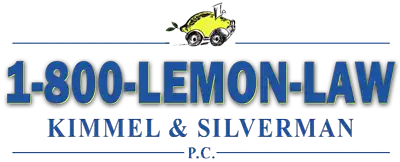New Jersey Lemon Law
Free Legal Help for NJ Drivers
New Jersey has the strongest Lemon Law in the Country, protecting consumers whose vehicles have been out of service repeatedly for one issue, or an extended period of time for any number of issues. Think you are driving a lemon car, truck, or bike? Here are answers to frequently asked questions about the New Jersey Lemon Law:
- What is the New Jersey Lemon Law and how does it work?
- How much does an NJ Lemon Law attorney cost? Is legal representation free?
- Does a problem always have to occur three times (or more) to be considered a lemon under the Lemon Law?
- What if my first problem occurs after the 24-month/24,000 mile period? Do I still have a claim?
- Does the New Jersey Lemon Law Cover Leased Vehicles?
- Does the NJ Lemon Law cover motorcycles?
- My car is brand-new or only a few days old, and I'm already having problems with it. Should I just return it to the dealership?
- What is the proper procedure for opening a Lemon Law claim in New Jersey?
- Does the Lemon Law cover used vehicles (cars, personal trucks, motorcycles)?
- What is NOT covered by the New Jersey Lemon Law?
- Do I need representation from a Lemon Law attorney in NJ to file my claim?
- The Magnuson Moss Warranty Act
- Why Call 1-800-LEMON-LAW to handle your New Jersey Lemon Law claim?
- Recent Success Stories:
- Serving All New Jersey Counties
- Kimmel & Silverman PC, New Jersey Lemon Law Attorneys
What is the New Jersey Lemon Law and how does it work?
The New Jersey Lemon Law provides cost-free legal help to distressed drivers whose cars, personal trucks, or motorcycles suffer a repetitive non-conformity or are in the shop for an extended time within the first 24 months or 24,000 miles, whichever comes first. Potential remedies include a complete repurchase, a brand new car, or significant compensation along with continued ownership of the vehicle.
In order to qualify for the New Jersey Lemon Law, the vehicle must be purchased, leased, or registered in the state, plus:
- Your vehicle is covered under an original, extended, or power-train manufacturer’s warranty.
- Your car has been back to the shop three or more times for the same issue or 20+ calendar days for one or more issues.
- The problem must begin to be repaired in the first 24 months or 24,000 miles, whichever comes first.
If you’ve answered yes to the above statements, you may qualify for FREE legal help under the New Jersey Lemon Law or Federal Warranty Law.
Problems occur outside the first 24 months or 24,000 miles? We still may be able to help. The state covers cars that do not meet the Lemon Law criteria under the Federal Magnuson Moss Warranty Act or the New Jersey Used Car Lemon Law.
Call 1-800-LEMON-LAW or click below for help
Contact a New Jersey Lemon Law Attorney!How much does an NJ Lemon Law attorney cost? Is legal representation free?
When you use our services, it won’t cost you a dime. This is because of the law’s fee-shifting provision which states that if your case results in success, all related legal fees and costs will be covered by the faulty vehicle manufacturer – on top of any recourse or as mandatory part of any settlement. Even if for some reason an unfavorable outcome takes place, there are no charges whatsoever to worry about! Basically allowing you to take action without risk – 100% free!
Does a problem always have to occur three times (or more) to be considered a lemon under the Lemon Law?
Not always. If your vehicle is in the shop for 20 days or more within the first 24 months or 24,000 miles of owning the car, we can file a claim under the Lemon Law in the state of New Jersey. These 20 days do not need to be consecutive, nor for the same problem, so long as they fall within the timeframe above.
Also, suppose a dealer cannot fix your car after one repair attempt for a problem that could cause death or serious bodily injury. In that case, you may have a potential claim.
We handle each case on an individual basis and have made exceptions in the past.
What if my first problem occurs after the 24-month/24,000 mile period? Do I still have a claim?
You might. If you’re having an ongoing problem with your vehicle, and your car is still under the manufacturer’s warranty, we can still help you under the Federal Magnuson Moss Warranty Act. Under this law, consumers can receive significant monetary compensation to reflect the diminished value of their vehicle as a result of the problem, plus they get to keep the vehicle.
Much like the Lemon Law, legal representation is 100% cost-free under the Magnuson–Moss Warranty Act.
Does the New Jersey Lemon Law Cover Leased Vehicles?
Yes. One of the potential outcomes could be immediately released from your lease agreement while receiving all the monies previously spent, minus a small mileage offset based upon the mileage you first reported your non-conformity.
Does the NJ Lemon Law cover motorcycles?
Yes, the Lemon Law in NJ covers motorcycles with the same degree of protection provided to cars and personal trucks. That includes newly purchased or leased motorcycles. The law could entitle you to a complete replacement of the or a refund of the purchase price.
Similar to the lemon law for cars and trucks, representation is completely free.
The New Jersey motorcycle lemon law calls for three unsuccessful repairs or 20 calendar days out of service within two years or 24,000 miles.
My car is brand-new or only a few days old, and I’m already having problems with it. Should I just return it to the dealership?
No. While problems can occur immediately, even in brand-new vehicles, you must follow proper procedures if you hope to open a claim under the Lemon Law. The most important thing to do initially is to take your vehicle to a manufacturer’s authorized dealership for repairs. Once your car/truck/motorcycle is returned to you, make sure you get and keep a copy of any repair invoices.
What is the proper procedure for opening a Lemon Law claim in New Jersey?
The proper procedure for opening any Lemon Law claim includes:
- Making an appointment with a manufacturer-authorized dealership to have your car examined and repaired.
- Obtaining a repair invoice when you pick up your car, personal truck, or motorcycle.
- Checking the invoice, making sure it properly outlines all problems disclosed to the service manager.
- Maintaining a personal log of all repair visits.
- Please keep a copy of all invoices – this is important and will help your case move along more smoothly.
While we understand that dealing with a defective vehicle can be incredibly frustrating, do not try and give it back to a dealer. Surrendering a car can be considered a “voluntary repossession,” which could damage your credit score.
If you are having problems with any vehicle, consult a Lemon Law lawyer immediately.
Does the Lemon Law cover used vehicles (cars, personal trucks, motorcycles)?
While there is a New Jersey Used Car Lemon Law, it only applies to dealerships. The NJ Used Car Lemon Law does not apply to manufacturers or warrantors.
Typically, we prefer to represent consumers under the Magnuson–Moss Warranty Act. As mentioned earlier, this law provides the same cost-free representation as the New Jersey Lemon Law, protecting consumers with used cars who have repeated problems under an original or extended manufacturer’s warranty.
It’s important to note that if a dealer does not disclose a salvage, flood, or reconstructed title at the time of sale, the consumer may have rights to a dealer’s fraud claim under the NJ Unfair Trade Practices Act. We have handled many of these claims as well and we would be happy to review your situation to determine if we can help.
What is NOT covered by the New Jersey Lemon Law?
The Lemon Law in NJ does not cover commercial vehicles and the living facilities of motor homes.
Do I need representation from a Lemon Law attorney in NJ to file my claim?
While it’s possible to file a claim through the Better Business Bureau (BBB), through the NJ Consumer Affairs office, or on your own, it is strongly recommended that you instead work with an experienced Lemon Law attorney.
In fact, many consumers prefer to pursue their claim with an experienced lawyer, as all fees and legal costs are completely covered under the Lemon Law in New Jersey. There’s no risk involved when consulting an attorney regarding your claim, and in many instances, cases can be settled more quickly in pre-litigation, without the need to file a lawsuit.
Both the NJ Consumer Affairs office and the BBB are very selective in the cases they will accept, often turning away strong, legitimate claims. Likewise, the decisions made by the NJ Lemon Law Unit are legally binding and if you lose your case, there may be no way to appeal.
The Magnuson Moss Warranty Act
If your vehicle does not meet the requirements for a lemon law claim, don’t lose hope! You could still receive a monetary remedy under federal law via the Magnuson Moss Warranty Act. This act applies if your car has been in the shop three or more times for a single problem under an original or extended manufacturer’s warranty.
Why Call 1-800-LEMON-LAW to handle your New Jersey Lemon Law claim?
Since 1991, the law firm of Kimmel & Silverman has successfully resolved more than 185,000 Lemon Law and breach of warranty claims in the Northeast. We have recovered more new cars and buy-backs than any other Lemon Law firm. We have more experienced attorneys than any other firm in New Jersey, representing consumers from every county in the state.
Kimmel & Silverman is the only consumer law firm ever asked by the state of New Jersey to teach arbitrators and mediators the fundamentals of Lemon Law and how to hear Lemon Law cases. Founding partner Robert Silverman and NJ Managing Attorney Jacqueline Herritt have both been named New Jersey Super Lawyers, representing the top 5 percent of all attorneys in the state. Additionally, several of our associates have been honored as New Jersey Rising Stars and we are especially proud to be named 2017 Leaders in Litigation by the NJ Law Journal.
In addition, 1-800-LEMON-LAW Founding Partner Bob Silverman worked with the late Center for Auto Safety Executive Director Clarence Ditlow to create the most effective automotive consumer law in the Nation.
When you choose Kimmel & Silverman to represent your New Jersey Lemon Law claim, you’re getting 100% cost-free representation, win or lose. You have nothing to lose but your lemon car.
My Mini was returned this morning and I received my settlement check without incident. I would like to express my sincerest gratitude to you and everyone who worked tirelessly on my behalf. I could not be more satisfied with my settlement and know it wouldn't have happened had I not contacted 1-800-Lemon-Law. I hope to never need the services of Kimmel and Silverman in the future but if I do I know I'm in good hands. Warmest Regards,
~ Ryan S.Recent Success Stories:
Since 1991, Kimmel & Silverman has resolved more than 30,000 cases throughout New Jersey, successfully helping more NJ drivers than any other Lemon Law firm in the country!
Here are some recent success stories:
- 2022 Chevrolet Silverado 1500 in 3x for instrument cluster randomly going blank. Client kept car and received $10,000 plus attorney fees.
- 2022 Cadillac Escalade stopped in the middle of the road x2, out of service 20+days. Client kept car and received $24,000 plus attorney fees.
- 2021 Cadillac XT5 in 6x for electrical issues. Client kept car and received $12,000 plus attorney fees.
- 2022 Kia Sorento with transmission failure. FULL NJ LEMON LAW REPURCHASE.
- 2023 Volvo XC90 out of service for switching from electric to gas, customer’s letter to Volvo ignored. Client kept car and received $19,000 plus attorney fees.
- 2023 Kia Sportage Hybrid overheating x3, FULL NJ LEMON LAW REPURCHASE
- 2018 CPO Nissan Altima with no start problem x3. Client kept car and received $6,249 plus attorney fees.
- 2022 Kia K5 in3x for warped rotors x3. Client kept car and received $6,000 plus attorney fees,
- 2022 Volvo XC60 in 3x for navigation. Client kept car and received $15,600 plus attorney fees.
- 2021 Audi Q8 in 3x for locking mechanism. Client kept car and received $6,750 plus attorney fees.
- 2022 Kia Sportage with transmission failure. FULL NJ LEMON LAW REPURCHASE.
- 2022 Chevrolet Traverse in 3x for hesitation and jerking. Client kept car and received $13,000 plus attorney fees.
- 2022 Mercedes-Benz S-500 out of service over 20 days for door handles. Client kept car and received $8,500 plus attorney fees.
- 2019 VW Gold Attack SE in numerous times for dash warnings. Client kept car and received $5,750 plus attorney fees.
- 2021 Ford F150 XLT in for HVAC issues, water leaks and cosmetic defects. Client kept truck and received $6,000 plus attorney fees.
- 2021 Dodge Durango, engine failure at 29,000 miles Client kept truck and received $6,000 plus attorney fees.
- 2023 Kawasaki Ninja ZX-6R out of service over 30 days with blown head gasket. FULL NJ LEMON LAW REPURCHASE
Serving All New Jersey Counties
Kimmel & Silverman PC, New Jersey Lemon Law Attorneys
1930 E. Marlton Pike
Executive Mews, Suite Q29
Cherry Hill, NJ 08003
Phone: (856) 429-8334
Fax: (215) 540-8817
Get Directions
Call 1-800-LEMON-LAW (1-800-536-6652) now for your FREE Lemon Law case review
Get rid of your lemon!


